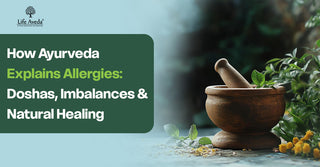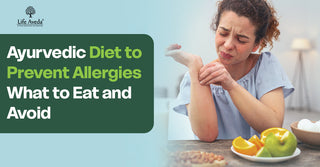The number of females with ovarian cysts is increasing day by day. The reason behind this is the lifestyle and diet we are following. Cyst development in ovaries is a complex process and is influenced by the imbalance of hormones as well. Ayurveda understands this situation as a result of srotas blockage. Srotas are the microchannels in the body that get blocked by the accumulation of endotoxins. Endotoxins are produced by the imbalance of the primary energies of the body called as Vata, Pitta and Kapha. These endotoxins are known as Ama in Ayurveda and are the reason for development of multiple diseases and disorders. The story behind development of ovarian cyst pain starts from a mismanaged lifestyle and incompatible food combination. This results in digestive disturbance and thus production of Ama. Slowly, with time this ama starts accumulating in microchannels of the body and moves into different parts under influence of Vata.
Key Takeaways
- Ovarian cysts are harmless and do not cause any symptoms.
- They will not hamper or bring any changes in your menstrual cycle.
- They are formed nearly or immediately after ovulation.
- In rare cases symptoms such as nausea, vomiting and fever occur. These are the signs of infection.
- Another scenario is when a large ovarian cyst results in torsion or twisting of the ovary. This is called Adrenal Torsion. It cuts off the blood supply to the ovary thus causing permanent damage. It's an medical emergency,
- Large Ovarian Cysts are diagnosed during random pelvic examination or transvaginal ultrasound. Such cysts are associated with pain in the right or left lower pelvic.
What are the causes of ovarian cysts?

The causes of ovarian cysts are as follows:
- Ovulation:It is the leading cause of cyst formation.
- Abnormal Cell Reproduction: Atypical cell reproduction can cause cysts like dermoids and cystadenomas. Dermoid cysts are slow growing with cystic masses filled with oil and skin cells lined by skin. On the other hand, cystadenomas are epithelial neoplasms.
- Endometriosis: In advanced stages of endometriosis, a condition in which the inner lining of the uterus, the endometrium starts growing out of the uterus as well. Like in ovaries thus causes endometrioma.
- Pelvic inflammatory disease (PID): In such cases pus filled cysts are likely to develop in or around ovaries.
- PCOS (Polycystic ovarian syndrome): It is a very common condition resulting in multiple ovarian cysts and has the capability to disturb the menstrual cycle as well.
What are the symptoms of Ovarian Cysts?
The ovarian cyst may or may not cause symptoms. These are as following:
- Bloating or pressure in lower belly
- Increased urine frequency
- Pain in lower abdomen
- Unexplained Weight Loss
- Changes in motion frequency and digestion
- Fatigue
- In cases like PCOS it is associated with irregular menstrual cycle, unwanted hair growth, difficulty to get pregnant etc.
What are the risk factors of ovarian cysts?
The risk factors for ovarian cysts includes:
- Age: The females of reproductive age are more likely to get ovarian cysts.
- Hormonal disturbances: It can also result in the same.
- Females on fertility drugs: It increases the risk to develop cysts.
- Endometriosis: Females who are diagnosed with endometriosis are also at a risk of developing ovarian cysts.
Ayurveda for Ovarian Cysts

Ayurveda is a holistic science which is known to help the human population for a very long period of time. From simple conditions like cough and cold to complex situations like development of ovarian cysts Ayurveda has solutions for all troubles. Following are the points that how ayurveda help in ovarian cysts:
- Herbs like guggul, kanchaar, lodhra, shatavari etc. are of great help. They stabilize the hormones and reduce the size of cysts.
- In most of the cases, internal intake of medication fulfills the purpose. But in some cases like in PCOS, Uttar Basti is also recommended. It is a procedure in which the decoction or medicated oil is inserted through the vaginal route into the uterus. This procedure helps in reducing the size of cysts, improves ovarian function and restore hormonal equilibrium.
- Usually the preparations for Uttar Basti are done with herbs like aloe vera, shatavari, clarified butter, himalayan salt and many other herbs with different properties.
- Of Course with such medications and procedures a female must stick to a diet or to a lifestyle.
- Uttar Basti helps in regulating the hypothalamus pituitary ovarian axis and thus helps to regulate the menstrual cycle.
- Avoiding fatty food, oily food, spicy and pungent food is really important. Limiting intake of meat and meat products is equally important.
Summary
Ovarian cysts are becoming quite common in females of reproductive age and in many cases they are totally symptomless. But in cases like PCOS the situation can get worse and difficult to be left on its own. If the size of the cyst is large then a female can experience pain and discomfort while periods. A large cyst can twist the ovary as well resulting in a medical emergency. Ayurveda herbs and procedures can be of great help in such cases but restriction in diet and lifestyle is mandatory.



